Nigeria is a country blessed with an abundance of food. From the arid desert in the far north to the savannah in the middle belt and tropical rain forest of the deep south, each region produces a variety of produce and livestock some of which are peculiar to the particular region. Naija cuisine is exceptionally delicious, Nigerians lovingly call their country Naija.
Nigerian cuisine is notably spicy, rich and colourful. It depends a lot on fresh and seasonal ingredients, making use of herbs, spices, seasonings, vegetables and a variety of proteins all in one dish. The main dish usually consists of a stew or soup served with some type of starch made into a mash called swallow.
Although there are over 250 ethnic groups in Nigeria, each having its own peculiar dishes or a twist to the common dishes, there are certain ingredients that are universal to the Nigerian Kitchen. These are must-have ingredients necessary to stock up a Nigerian pantry.
Nigerian Cuisine in the Diaspora
If you are in the Diaspora, Canada, USA, United kingdom or most parts of the world and need to stock your Nigerian kitchen or you are new to Nigerian cuisine (which is easier than you think) and want to learn how to stock a Nigerian kitchen, these are the ingredients that will often show up on your shopping list. Most African stores and Asian stores will have most of these ingredients.
With these basic pantry staples, you can cook an amazing variety of Nigerian dishes at home. In case I have left out any essential Nigerian pantry ingredient, please let me know in the comments section below. Thanks
How to stock a Nigerian kitchen: 32 Essential food ingredients for Nigerian cuisine
Oils
1. Palm oil
Palm oil is derived from the flesh of the palm fruit. It is vegetable oil and has a characteristic red colour because of a high level of beta-carotene. It is mostly found in the southern part of Nigeria where palm trees grow in abundance. Palm oil is mainly extracted during the peak season of palm fruits and then stored for use throughout the year. Using fresh palm oil is essential to Naija cuisine so to differentiate between fresh palm oil and old palm oil, you will need to smell or taste it. Fresh palm oil has a fresh fruity smell. It is the oil used in most soups originating from the southern region, it is also used in stews, puddings, porridge, side dishes, frying etc. Some people believe palm oil neutralises ingested poisonous substances.
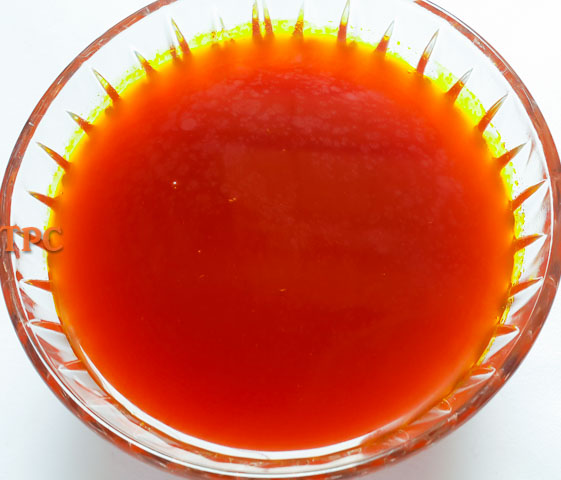
2. Pure Groundnut oil
Pure groundnut oil is a vegetable oil derived from groundnuts (Peanuts) which are in abundance in Northern Nigeria where they are grown. The purest form, unrefined, unadulterated groundnut oil is a premium oil. Pure groundnut oil is mildly flavoured especially when produced from roasted groundnuts, and it’s very good for frying. It is the oil used in Northern Nigerian soups e.g Miyan Kuka.
3. Vegetable oil
Most of the oils used in cooking in Nigeria are vegetable oils example palm oil and groundnut oil but in Nigerian parlance, vegetable oil is either soybean oil or bleached palm oil. They are used extensively in Nigerian cuisine, mostly in stews or for frying.
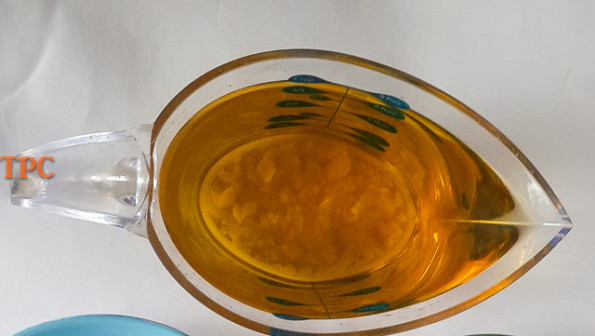
Vegetables
Nigerians eat a lot of green leafy vegetables, they include them in soups and stews, add them to their starchy dishes and they also eat them alone. The Nigerian climate is perfect for the growth of these vegetables and the variety is awesome. Some are peculiar to certain regions of the country while a few are grown everywhere.
4. Green amaranth (Callaloo)
Popularly called Green, this vegetable is very versatile in its use. It is also a good substitute for the Ugu vegetable. Variously called allayahu (Hausa), Inine (Igbo), Efo Tete and tete eleegun(Yoruba), it is used in Vegetable yam, vegetable sides, soups etc.
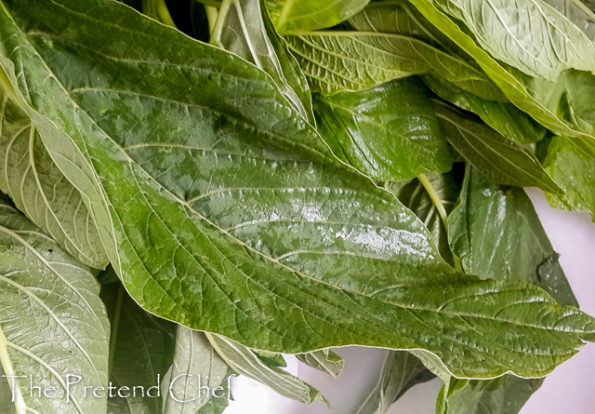
5. Ugu leaf
The ugu leaf is also very popular and versatile in its usage in the Nigerian kitchen. It has its own soup, Ofe Ugu or Ugu soup. It can be dried, stored and rehydrated for later use. Good substitutes are spinach and kale depending on what you are cooking.
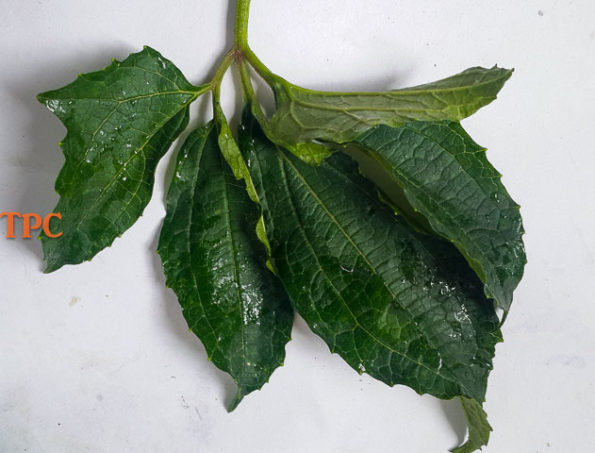
6. Fresh whole tomatoes
Fresh tomato is produced in abundance in Nigeria. from the sweet and fleshy ‘tomato Jos’ (UTC) or plum tomatoes to the tangy local species. Although in abundance all year round, it is seasonal. During the drier months when they are in season, tomatoes are cheap while in the rainy months, the price rises astronomically. Fresh tomatoes are eaten both cooked and raw, they are used in stews, salads etc. It is very important in Nigerian cuisine for Jollof rice and red stew.
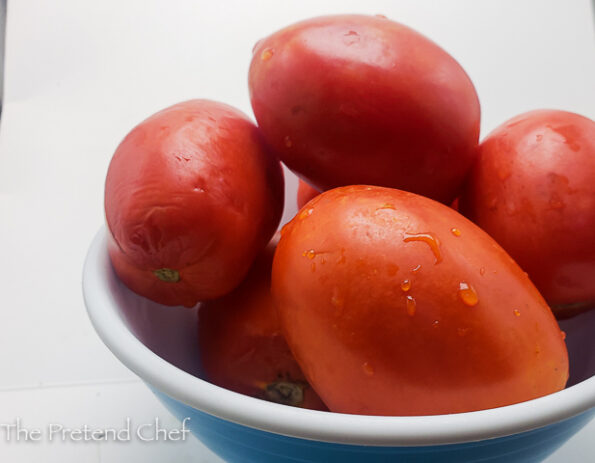
7. Okro
Okro (Okra, Lady’s finger) is enjoyed by Nigerians in their soup from the fresh tender okro used in the south to the dry okro used in the north. Soup made with either type of okro is delicious in its own way. It is either cooked as a one-pot soup or the fresh okro is steamed as a side and served with a tomato stew, Plain okro (ila).
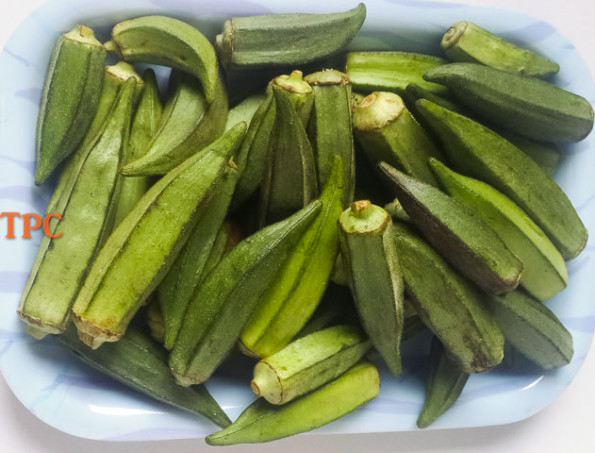
Meat & Fish
8. Beef
Beef is the most consumed type of meat in Nigeria. No part of the cow is wasted, from the head, the muscle, the entrails (offal, organ meat), skin, limbs to the tail (Oxtail). Each part can be turned into a delicacy. It is added to soups and stews, it is fried and served with rice and beans dishes, grilled as suya, dried as Kilishi, etc. Nigerians generally are meat lovers.

9. Dry fish
Dry fish is fish that is slowly smoked until dry. It is basically added to every soup and some stews, also to Yam porridge, Plantain porridge etc. It can be used for pepper soup. In soups, it acts as both seasoning and nutrient. The most common dry fish is catfish.
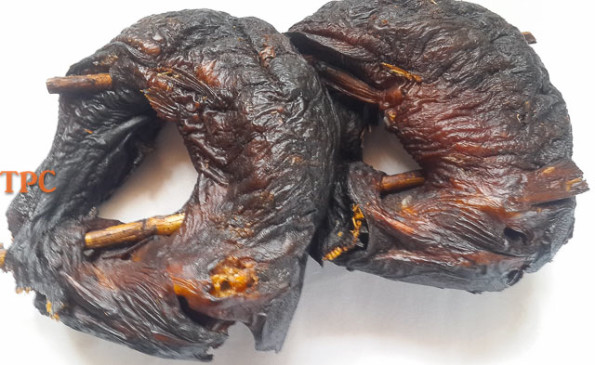
10. Stockfish
Stockfish is fish that is sun-dried in Norway. It loses all its water in the drying process but retains its nutrients. Cod which has a rich taste is mainly the fish of choice but other types of fish are also dried. Cod is more expensive than the other types. Stockfish has a peculiar fermented flavour that adds to the flavour of the dish. Used in most soups, stockfish can also be added to stew or be made into Pepper soup.
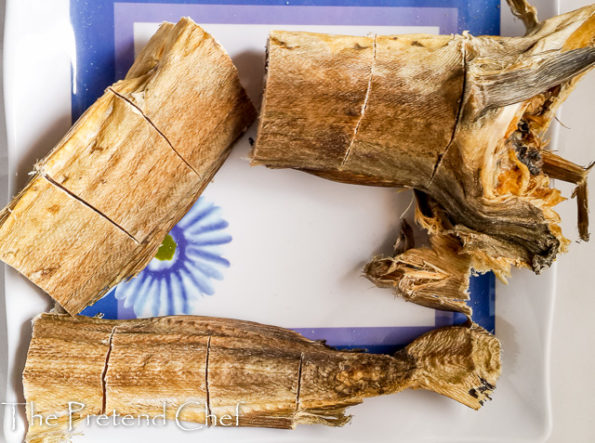
11. Crayfish
Crayfish in Nigeria are in fact dry shrimp. Fresh shrimps are dried by smoking or when the weather permits, sun drying. It is in abundance in the coastal freshwaters of southern Nigeria and is an essential ingredient in Nigerian soups. It is both a condiment and a cheap protein source. Dry crayfish is ground to a powder when added to soups, stews, rice or other dishes. It is sometimes added whole in some dishes like Abacha.
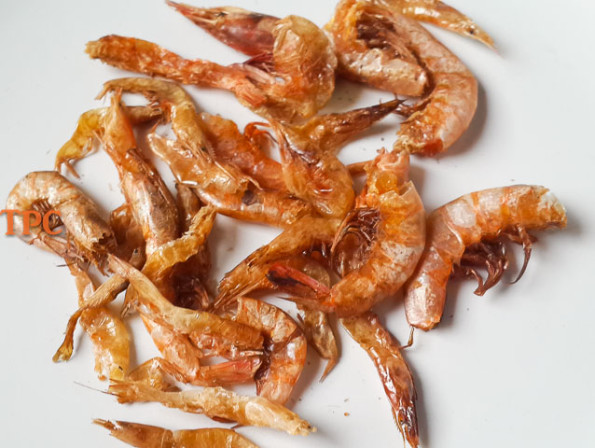
Starchy sides
12. Swallow: Garri, Fufu, Semolina, Wheat, Oat, Sticky rice
Every tribe in Nigeria has its own peculiar soups and some that are common all over the country. Swallow is the starch served with the soup. Usually, it is moulded into a small ball or bolus, dipped into the soup and swallowed whole hence the name swallow. There are the usuals, garri, pounded yam, fufu, tuwo, amala, starch, semolina then those that are made from grains, wheat, oat etc. recently health enthusiasts have taken swallow further and use cauliflower, cabbage etc.
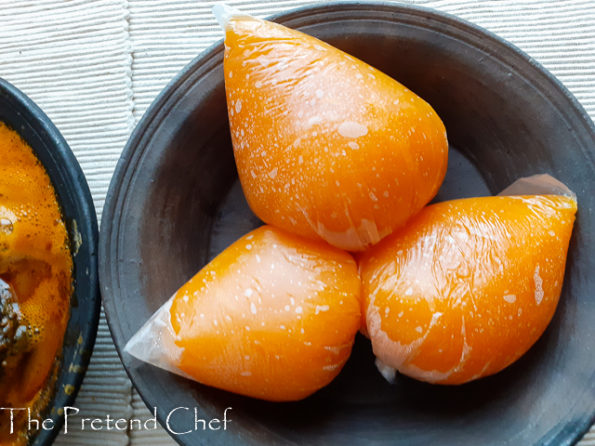
13. Rice
Rice has become a staple in Nigerian homes unlike before when it was consumed mostly once a week, on Sundays. Long grain rice was the most common variety but other types are appearing on dinner tables more and more, like basmati and jasmine rice. Also, with the ban on the importation of rice, Nigerian homegrown rice with its wide variety is being appreciated more and more.
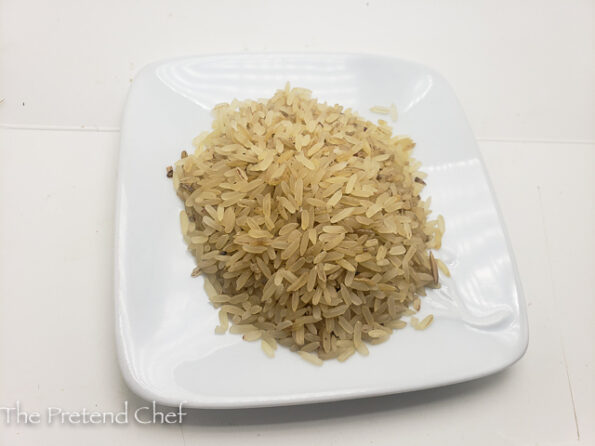
14. Beans
A staple in Nigerian homes, every Nigerian mother emphasises the health benefits of beans to her children. The most common variety is the black-eyed beans or simply called white beans. There are a variety of white beans available e.g Iron beans, Potiskum etc. and there are the brown beans oloyin, olotu etc. Beans is made into beans porridge, Akara (bean cake), Moimoi (bean pudding), Rice and Beans Jollof,
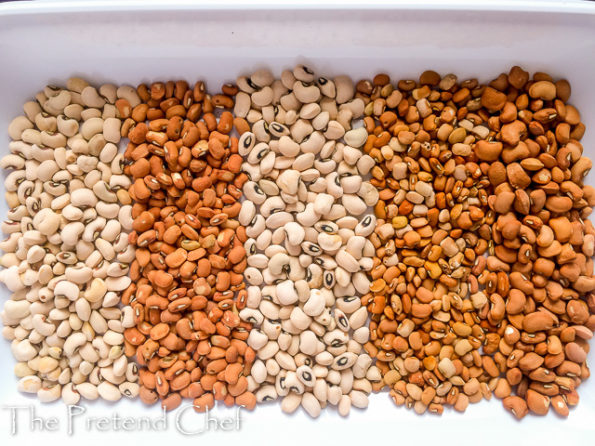
15. Yam
This is a tuber that grows in most parts of Nigeria, it is not the same as the sweet potato which is called yam in the United States, so this is sometimes called true yam, African yam, yuca yam etc. Yam is a king of crops and is held in high esteem in places where it is grown, some even have festivals dedicated to it. It can be eaten boiled, fried, baked, roasted, mashed etc.
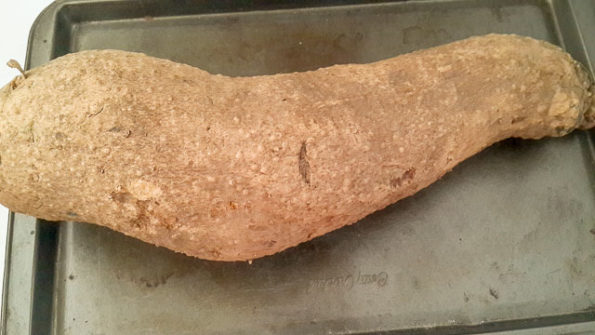
16. Plantain
Plantains grow in abundance in southern Nigeria. It appears regularly on the menu in the home, plantains are served as breakfast, lunch or supper. They are mostly fried or roasted, also cooked as porridge and swallow. Plantains make a great snack as plantain chips, both ripe or unripe.
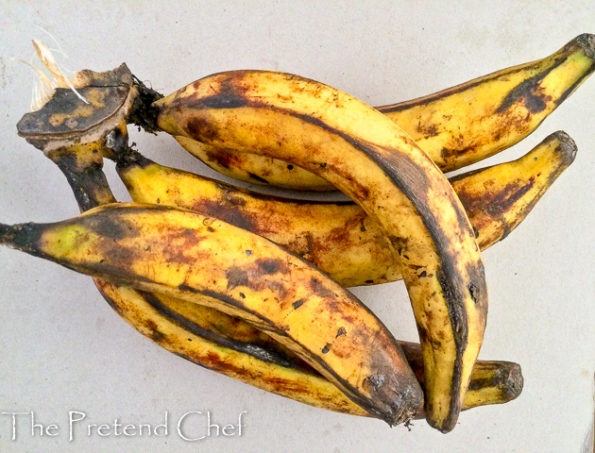
Aromatics
17. Fresh Pepper (Atarodo, Ose Oyibo, Atarugu, Habanero)
Nigerian cuisine is not complete without fresh pepper. Fresh pepper is used in basically every Nigerian dish and the heat level ranges from not so hot to fire-in-my-mouth hot. The green (unripe) peppers are used in dishes like Green ofada (ayamase stew). It is available all year round and is eaten cooked or raw.
19. Scotch bonnet (Ose Nsukka, Cameroun pepper)
This is a special kind of pepper, it has a sweet, floral aroma and it is very hot. It is available fresh (Ose Nsukka) or dry (Cameroun pepper). Scotch bonnet is seasonal in Nigeria so when it is out of season, the dry one which is always available is used although there is a marked difference in their flavours. Scotch bonnet is delicious in Okro soup, Fisherman soup and different types of vegetable soups e.g Vegetable soup, Afang soup, Editan soup etc. Green unripe scotch bonnet adds a special flavour to Nigerian spicy rice.
20. Tatashe
Tatashe is different from red bell pepper but close enough as a substitute. It is not very spicy but adds colour to many dishes like Nigerian jollof rice, Moimoi and Nigerian Tomato stew. It is usual to deseed it before grinding for use.
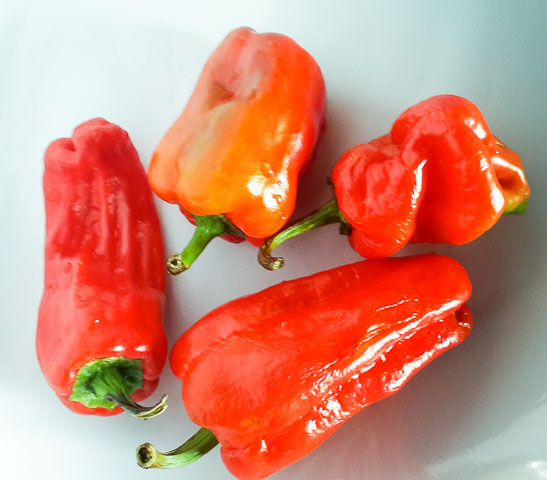
21. Shombo
Cayenne pepper is moderately spicy, slender and long with a distinct flavour. Used in different stews, moimoi etc. It is also dried and roughly ground to make chilli flakes.
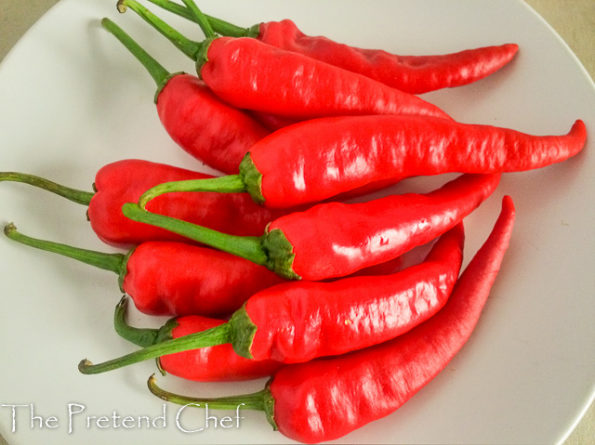
22. Bird’s eye chilli (Dry pepper)
These are small, slim & elongated peppers. Mostly sold dried hence the name dry pepper. There are different varieties of this, some hotter than others. It is also versatile in its use, it can be used in most dishes and spice mixes e.g Suya spice when you only want to add heat and not much flavour to a dish. Salt and Ground dry pepper is what you will find in the cruet set (Salt & pepper shaker) on the dining table of a typical Nigerian home.
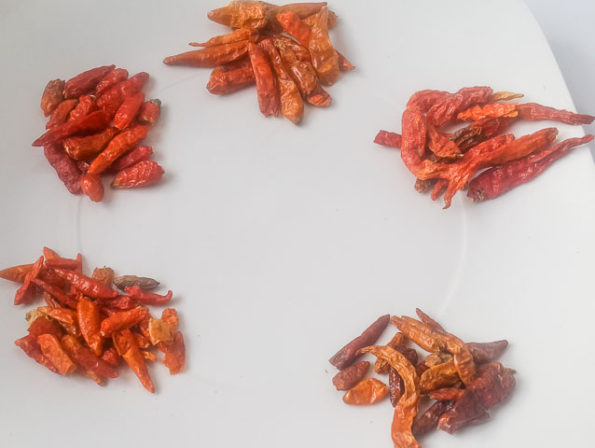
23. Onions
Onions are another pantry staple in Nigeria, precisely, red onions. The red onion is the onion of choice, and it is produced in abundance in Northern Nigeria. It is usually paired with fresh tomatoes and peppers to produce a wide range of dishes. Onions are served raw or cooked. The White onions are mostly blanched and added to Vegetable salad. Used in stews, soups, raw in salads, meat dishes e.g suya, asun etc.
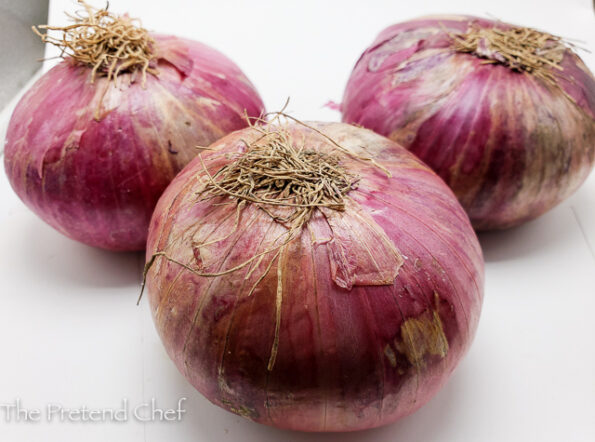
24. Garlic & Ginger
These two condiments are like twins to the Nigerian cook. Hardly are they used separately. In fact, the health benefits touted by Nigerians about garlic and ginger are numerous. However, they enrich stews and some soups. They are used to season meat and fish, also drinks and so much more.
Spices
25. Curry powder
Curry powder is a blend of different spices with turmeric giving it its characteristic yellow colour. In Naija cuisine, curry powder is used in stews, sauces and seasoning of meat and fish, an essential pantry ingredient.
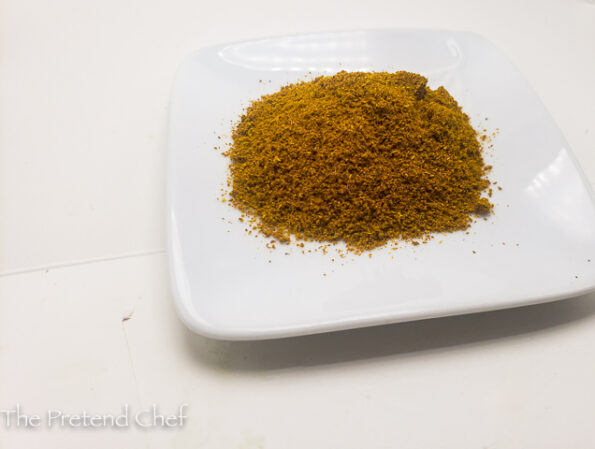
26. Thyme
In Nigeria, thyme is mostly used dried. Fresh thyme is not commonly available. It is used in stews, sauces and seasoning of meat and fish, it is present in most pantries in the Nigerian home.
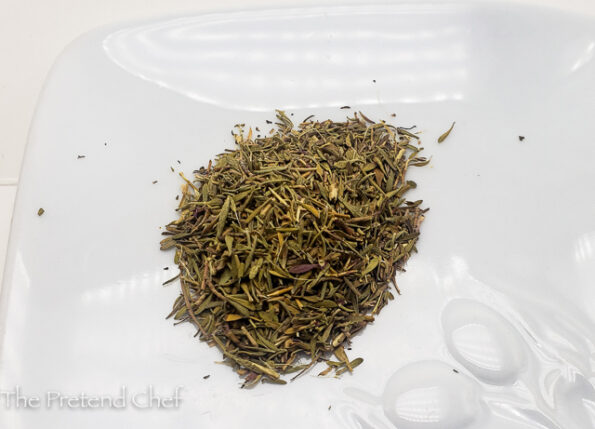
27. Uziza, Uda, Ehuru, Oburunbebe, Uyayak
These are some of the local spices used in Nigerian cuisine. They all have their peculiar taste when used individually but most times they are used in different combinations to form a spice blend that tastes exquisite. They are part of the Nigerian pepper soup spice blend, Banga spice blend, Suya spice blend, Ukodo spice blend etc. Some are added to Isiewu, Nkwobi, Abacha, some soups (Osumada), etc.
Condiments
28. Tomato paste
Tomato paste is a thick concentrate of tomatoes with the skin and seeds removed. It is different from tomato puree which is a thinner and sometimes seasoned tomato condiment. There are so many brands to choose from. It is used for the delicious Nigerian jollof rice and gives it its characteristic reddish colour. It is also used in stews, sauces and pasta.
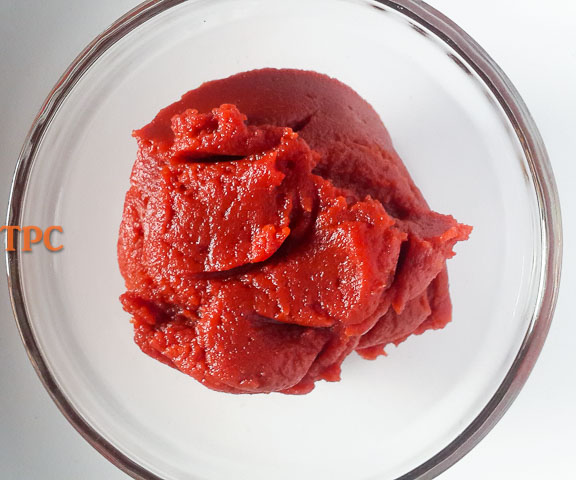
Seasoning
29. Seasoning cube
A Nigerian pantry is not complete without seasoning cubes or powder, in fact, what will modern Naija cuisine taste like without seasoning cubes. They are available in both powder and cubes, there is so much variety to choose from although there are some brands that are household names. They come in all-purpose, chicken and crayfish flavours. Seasoning cubes are used to enhance the flavours and improve the taste and aroma of Nigerian cuisine. They contain monosodium glutamate (MSG) and are heavily used by most commercial caterers in Nigeria. They are also called bouillon cubes, stock cubes or broth cubes.
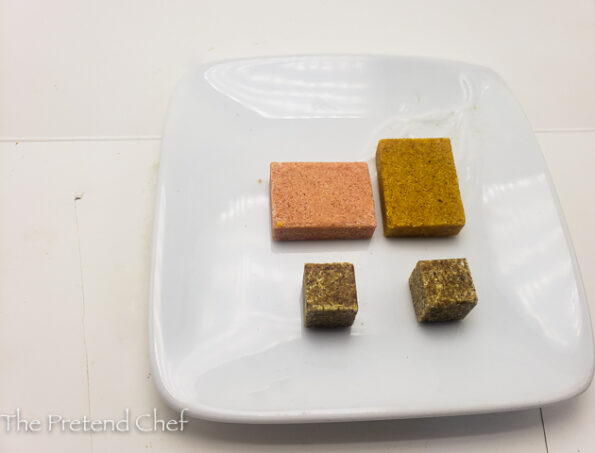
30. Local seasoning
These add that special umami flavour to Nigerian cuisine. They all have a pungent aroma which adds a desirable depth of flavour that is evidently lacking once the seasoning is missing in the dish. These local seasonings are produced from fermented oil-producing seeds.
i) Iru
Iru is brownish in colour and made from fermentation locust bean. It is mostly used whole in soups and stews in western Nigeria e.g Ofada stew. There are two types of iru, iru woro is the whole ‘dry’ variety and iru pete is the pasty, partially grounded variety that feels wet.
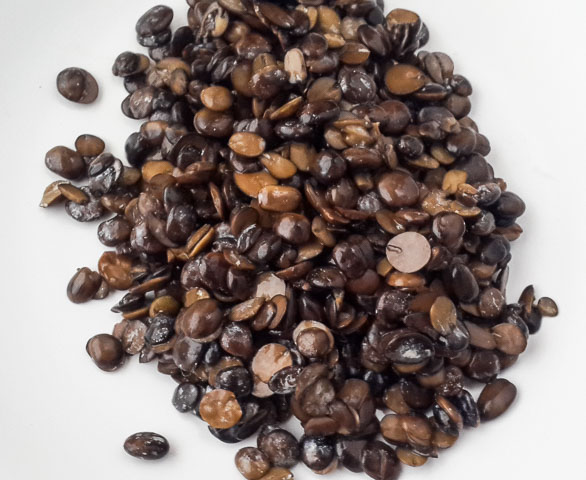
ii) Dawa Dawa
Dawadawa is also made from locust bean but after fermentation, it is moulded into flat discs or cakes and dried which gives it its characteristic black colour. It is ground before adding to the dish. Dawa dawa is used in soups and stews mostly in Northern and middle belt Nigeria.
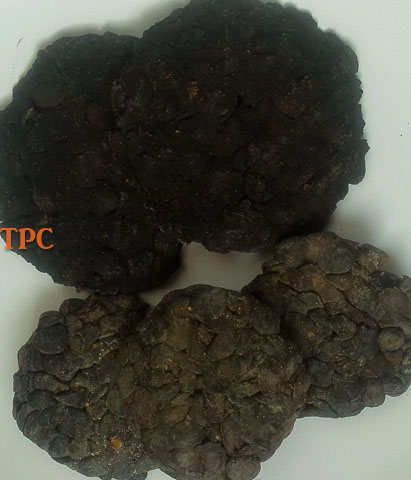
iii) Ogili isi
Ogili isi is a thick grey paste (ranging from pale grey to very dark grey) made from castor oil beans and sometimes egusi seed (melon seeds). It is used in soups like Onugbu (Bitterleaf Soup) and added to Abacha (Tapioca salad) etc. It is predominantly used in eastern Nigeria.
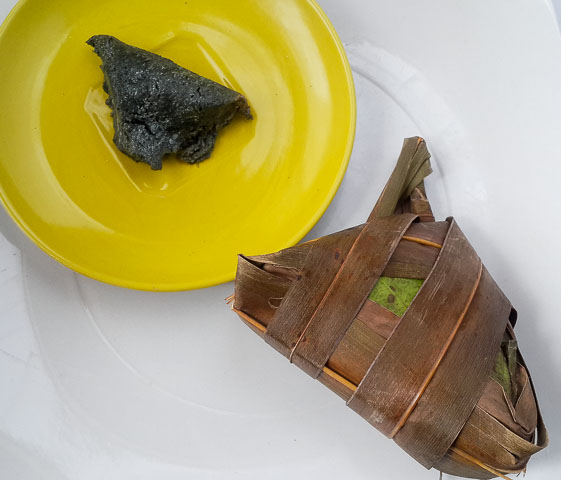
iv) Okpei, Okpehe, Okpeye
Okpei is a firm ball made from the African mesquite seed, after fermentation and grinding, it is moulded into balls or other shapes. Premium okpeye comes from Nsukka in eastern Nigeria. It is added to soups and some rice dishes. Okpei is used in Eastern and middle belt Nigeria.
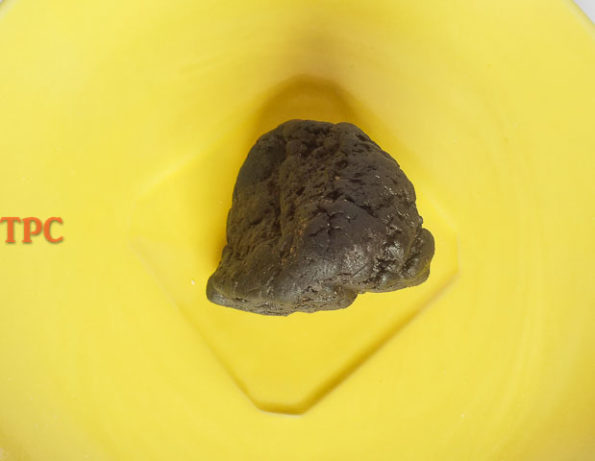
Herbs
31. Utazi
Utazi is bitter-sweet and used in Pepper soups to cut down on the rich meat or fish stock that forms the base of the soup. It is added to some meat dishes also to balance the richness of the sauce e.g Goat leg in spicy sauce, Nkwobi or tapioca salad. The underlying sweetness and flavour are harnessed when added to Utazi soup.
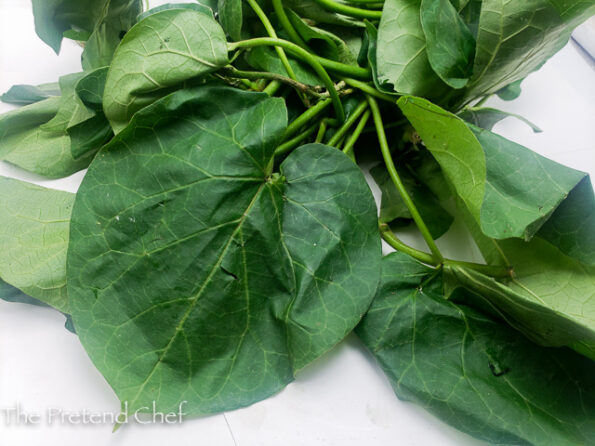
32.
Scent leaf: Clove Basil (African Basil)
This herb runs across most parts of Nigeria. It is highly aromatic and has a sweet-spicy taste and a flavour similar to clove. It can be used fresh or dried but it tastes more wholesome when fresh. Nchuanwu is used in rice dishes, dips, pepper soup etc. Sweet basil is not a good substitute for this. It is called Nchuanwu (Igbo), Ntong (efik), Efirin (Yoruba), Daidoya (Hausa) and Aramogbo (Edo).
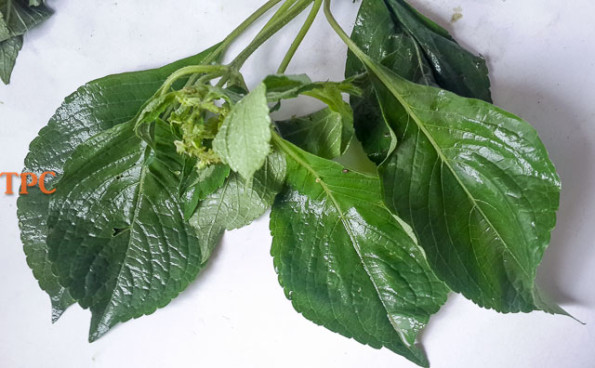
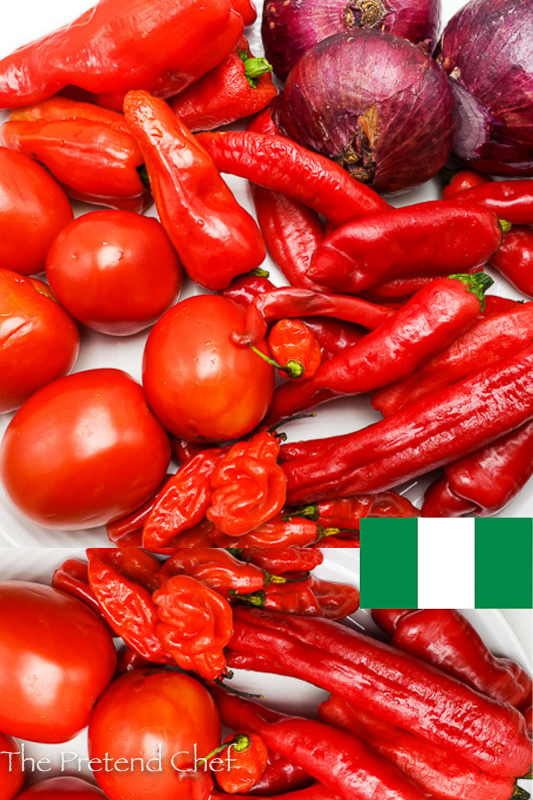
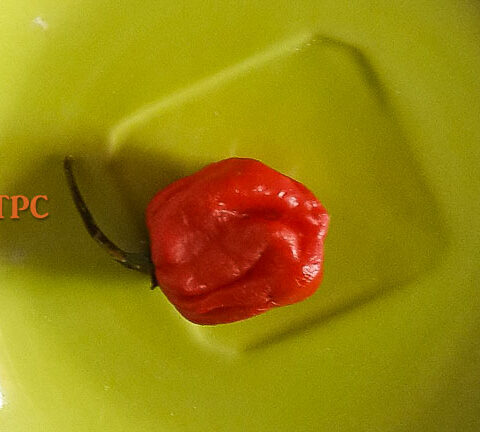
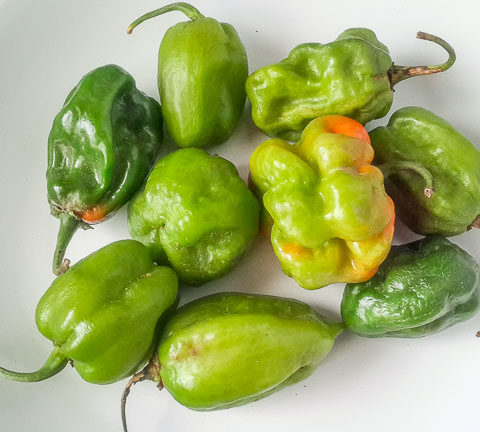
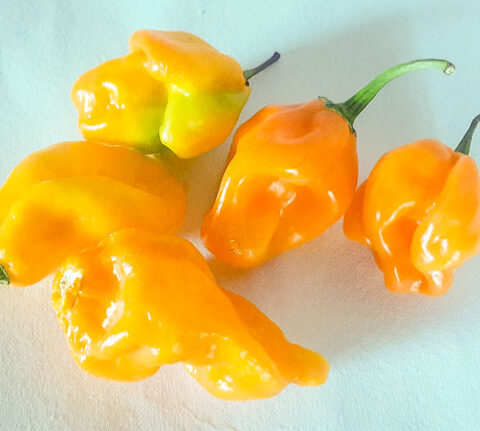
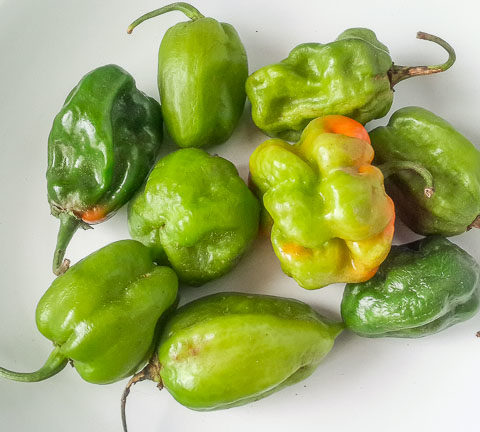
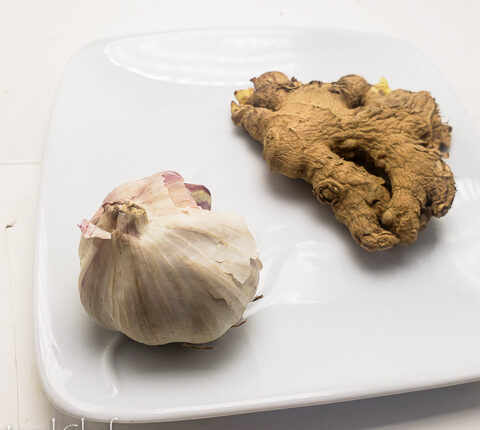
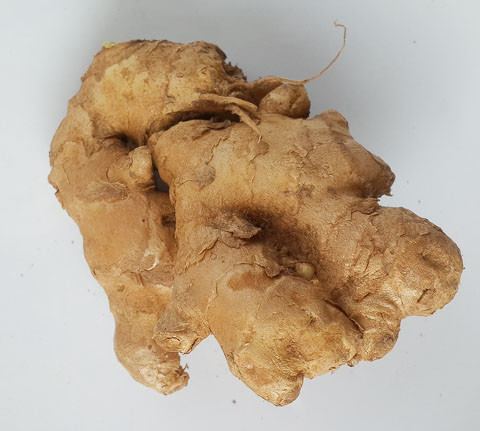
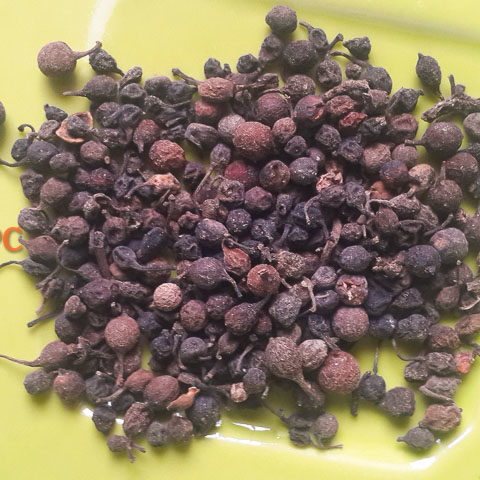
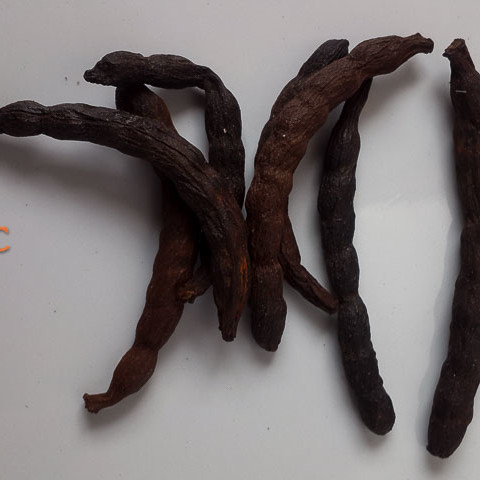
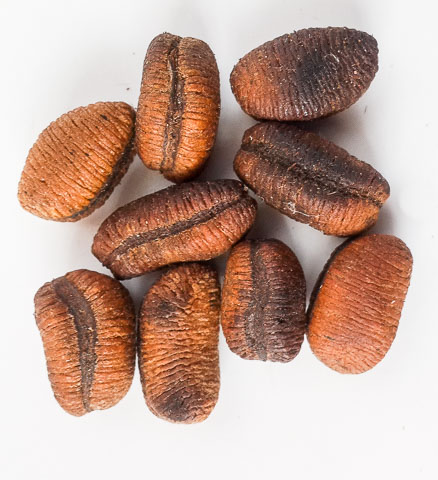
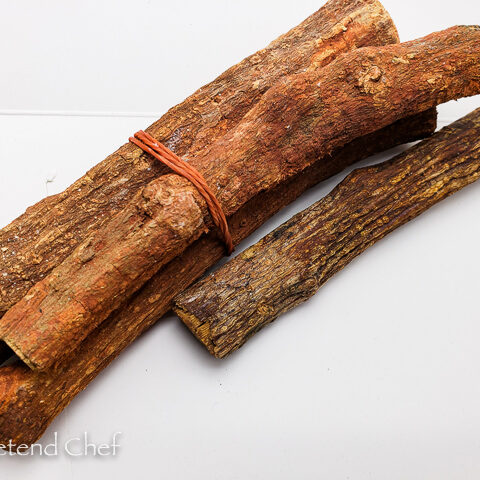
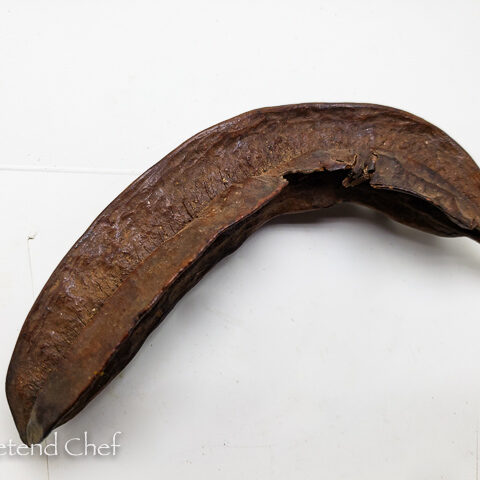
 I am Ganiru, a wife, a mother, a food blogger, a chef, an author and an accountant. I love to cook and write about food, especially Nigerian and afro-centric food...
I am Ganiru, a wife, a mother, a food blogger, a chef, an author and an accountant. I love to cook and write about food, especially Nigerian and afro-centric food...